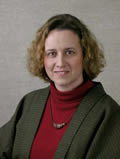


They’ve been dubbed "grassoline"—second generation biofuels made from inedible plant material, such as fast-growing weeds, agricultural waste and sawdust—and numerous scientific studies have shown them to be prime candidates for replacing gasoline to meet our transportation needs. However, before we can begin to roll down the highways on sustainable, carbon-neutral grassoline, numerous barriers must be overcome, starting with finding ways to break lignocellulosic biomass down into fermentable sugars.
Researchers at the Joint BioEnergy Institute (JBEI), a DOE Bioenergy Research Center led by Berkeley Lab, are using the natural auto-fluorescence of plant cell walls to dynamically track how ionic liquids are able to dissolve lignocellulose into fermentable sugars for the production of advanced biofuels. JBEI’s Blake Simmons and Seema Singh conducted a study that showed pre-treating switchgrass with the ionic liquid known as EmimAc caused a rapid swelling of plant cell walls as a prelude to their dissolution. More>
Materials Sciences Division researchers led by Ali Javey and including Zhiyong Fan, Haleh Razavi, Jae-won Do, Aimee Moriwaki, Onur Ergen, Yu-Lun Chueh, Paul Leu, Johhny Ho, Toshitake Takahashi, Lothar Reichertz, and Joel Ager, with UC Berkeley colleagues, have made efficient, cheap and flexible photovoltaics from arrays of nanoscale pillars, each a single-crystalline semiconductor. The nanopillar array offers much more surface for collecting light than a typical two-dimensional solar cell and is a more efficient collector and separator of charge carriers. The new design has been fabricated in clear plastic for a bendable solar cell. More>
 As part of the U.S. State Department’s Asia-Pacific Partnership (APP) on Clean Development and Climate, EETD’s China Energy Group is providing technical expertise and analysis of energy use in cement manufacturing to Chinese cement companies. Cement production is a major source of carbon dioxide emissions, and China accounts for nearly 50% of global cement production. The Berkeley Lab experts are part of an international team training 42 Chinese companies to operate more efficiently; a four-day workshop began in Beijing this week. Total project funding is about $1.8 million for three years, including $1 million to China and the remainder to the Lab, the World Resources Institute and E3M, Inc.
As part of the U.S. State Department’s Asia-Pacific Partnership (APP) on Clean Development and Climate, EETD’s China Energy Group is providing technical expertise and analysis of energy use in cement manufacturing to Chinese cement companies. Cement production is a major source of carbon dioxide emissions, and China accounts for nearly 50% of global cement production. The Berkeley Lab experts are part of an international team training 42 Chinese companies to operate more efficiently; a four-day workshop began in Beijing this week. Total project funding is about $1.8 million for three years, including $1 million to China and the remainder to the Lab, the World Resources Institute and E3M, Inc.
 Video: See James Symons Speak on YouTube
Video: See James Symons Speak on YouTubeIn a scientific keynote address on June 12 at Michigan State University (MSU) in East Lansing, James Symons, Director of the Nuclear Science Division, discussed the exciting research prospects of the new Facility for Rare Isotope Beams (FRIB) to be built at MSU’s National Superconducting Cyclotron Laboratory. The FRIB is a $550-million heavy-ion accelerator to study rare nuclear processes, including the way elements are formed in the hearts of stars. Click here for the video and here for an article
 Special Event: Women Scientists’ Council Luncheon Seminar
Special Event: Women Scientists’ Council Luncheon SeminarThe next Women Scientists’ Council Luncheon Seminar is scheduled for July 21 in Perseverance Hall (54-130) from 11:30 a.m. – 1:00 p.m. and will feature Melissa Lunden, staff scientist for the Atmospheric Sciences Department in EETD. Lunden will discuss her research involving atmospheric aerosols, inconspicuous airborne nanosized particles that significantly influence air quality, climate, and human health. Networking amongst participants will follow and lunch will be provided. For details contact Kamala Green at [email protected].
There is still space available for the Microsoft Word 2003 class being held July 16. The class, taught by CMC, is $50. Go here for information and to register. Email a project ID number to Karen Paris at [email protected] for payment, or call x5122.
Lab researchers, PIs and staff are welcome to attend any of four different vendor demonstrations for the electronic Sponsored Research Administration (eSRA) system. The demos take place July 13, 14, 21 and 22 from 9:30 a.m. to 4 p.m. The eSRA provides electronic cradle-to-grave proposal development and award administration with automated routings to improve the quality of non-DOE proposal development and award management. It will also integrate the Human Subjects, Animal Use and Conflict of Interest compliance offices to eliminate redundancies, save time, and increase compliance. To register, e-mail your job title, division name and preferred demo dates by COB on July 9.
Today at Berkeley Lab is produced by Public Affairs' Communications Department